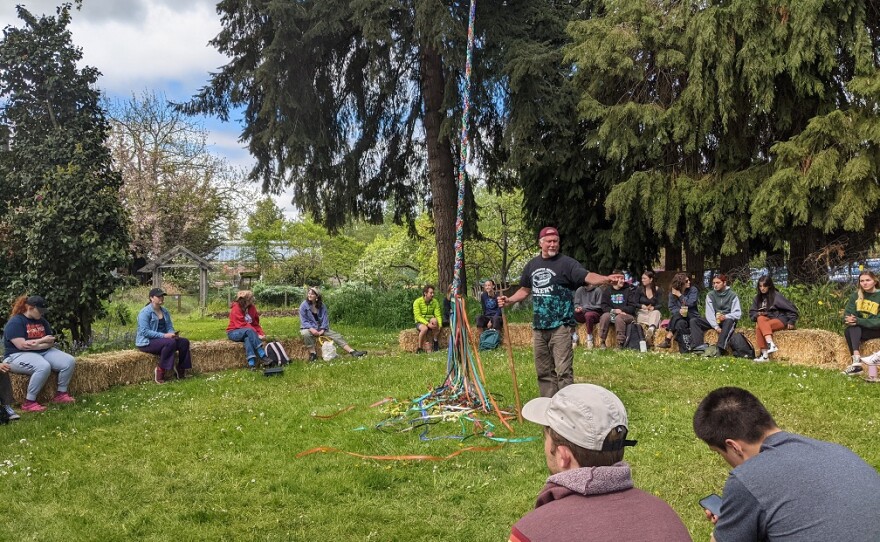For nearly half a century, the Urban Farm has provided University of Oregon students an interactive classroom that gives them hands-on experience planting and raising vegetables and fruit. But, plans for campus development may destroy part of the beloved garden and orchard.
Note: since publication of this story, the University of Oregon clarified that it expects the heritage orchard will remain intact. More information at their FAQ page
UO senior Grace Youngblood walked me through her “classroom” - a small orchard of fruit trees on the eastern portion of the Urban Farm.
“That one over there is a cherry,” she said. “And then we do have a couple of pears sprinkled in. And then, as we continue to walk, up to the left, those are going to be plums.”
This is what students call the “back 40”. Early next year, it might be an industrial site. The UO plans to use this as a staging area for construction of a 175,000 square-foot multi-story building for phase 2 of the Phil and Penny Knight campus for Accelerating Scientific impact. Masters student Kaleb Beavers said that would decimate the trees here.
“So that is going to potentially disrupt 35 orchard trees that are all about 25 years old, about a dozen Port Orford Cedar Trees that are like 60 years old,” he said. “And then, about 40% of our plantable garden beds.”
The area is also home to two heritage walnut trees that Youngblood said predate the University. She said this part of the farm was established in the 1990s, so the loss of all that planting soil is no small thing
“So it’s been about 30 years of cultivating that soil,” she said. “And I think that’s something that we’re trying to get across is that it’s not dirt. It’s soil. It’s topsoil. And that is a precious and depleting commodity. That we can’t continue to afford to lose.”
The Urban Farm has been on the north end of the UO campus for 46 years. The class is part of the Landscape Architecture department. It fills up quickly each term.
There’s a reason that this is maybe the most popular class at the University of Oregon,” said Harper Keeler, Director of the Urban Farm.
“It’s about food systems and natural systems and how learning about them can help us battle global climate change and other environmental challenges that we all are facing,” he said
Keeler said during construction next year, it will be a challenge to conduct class here. In the latest iteration of plans, the project would displace about 45 percent of the farm’s area.
“We’re kind of landlocked here in the amount of space we have. And the amount of space determines how many students we can accommodate,” Keeler said. “I think everyone is excited about the Knight campus to come and we’re hoping that we can look at ways to do the construction with the least amount of displacement as possible.”

The University states that it is working to minimize and mitigate the impacts on the Urban Farm and surrounding areas and to preserve as many trees as possible. Supporters hope the Knight campus plans can be amended so the space is preserved. The UO Student Senate recently passed a resolution in support of the Urban Farm.
Grace Youngblood created a web page called Save the Urban Farm to share information and gather testimonials from community members, alumni, and students about what the program has meant to them.
“So, there’s people from all walks of life, all stages of life that feel for this place and have had these experiences in the past and the urban farm has actually changed the trajectory of what they want to do with their life, which is something I understand,” she said.
Youngblood said that’s what happened to her.

“I wanted to show you this asparagus grove,” she said “I don’t know if you’re familiar with the way asparagus grows but I think that this was one of my, the first way that I connected really intensely with this space was seeing asparagus pop out of the ground. Because, I’ve eaten asparagus my whole life, and I didn’t know how it grew until I was 19!”
On Friday, May 6th at 5:30 p.m., supporters will hold a rally at the farm to raise community awareness. Organizers hope UO administrators listen and find a way to grow their campus but not at the expense of this treasured facility.
Copyright 2022 KLCC.







